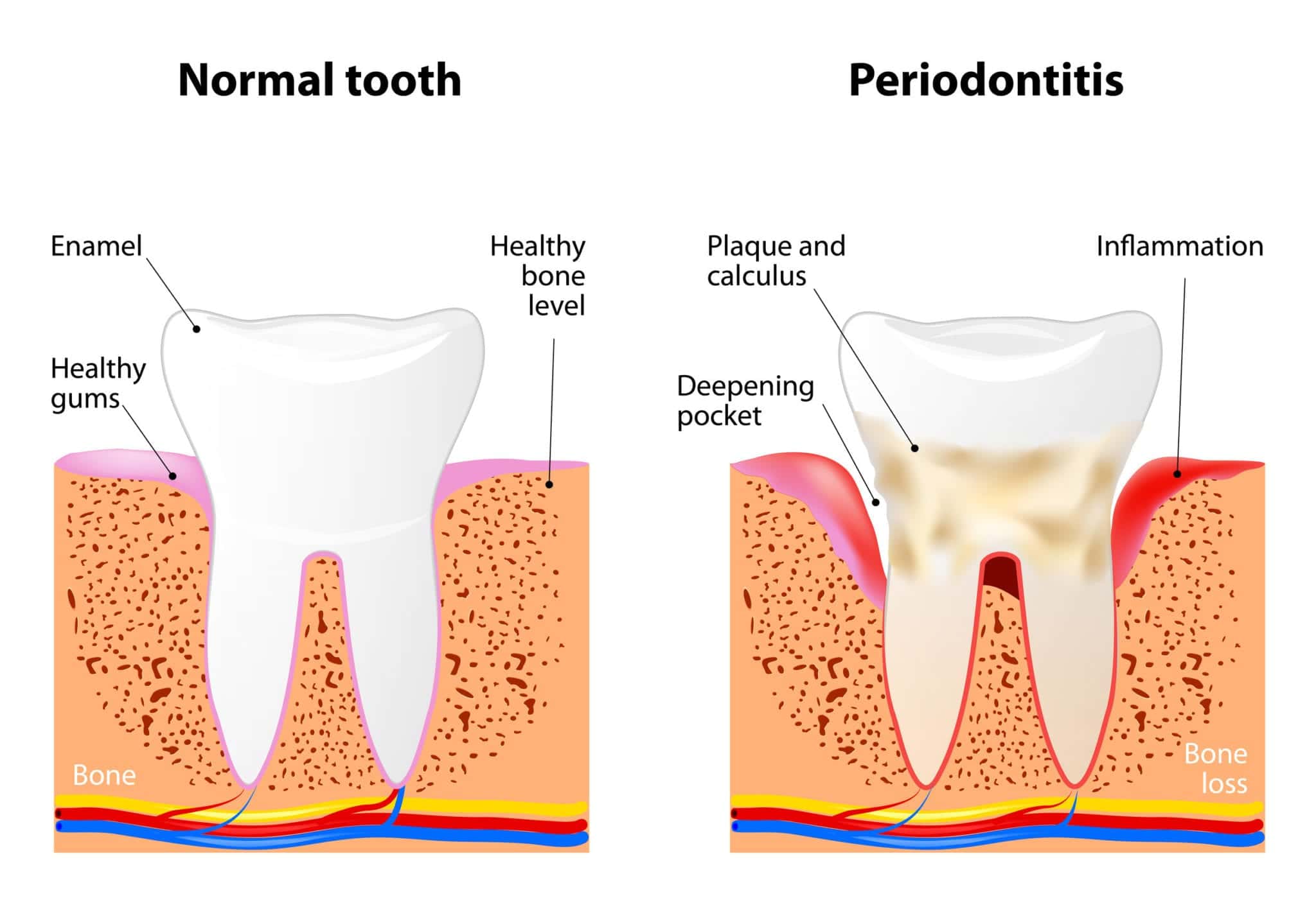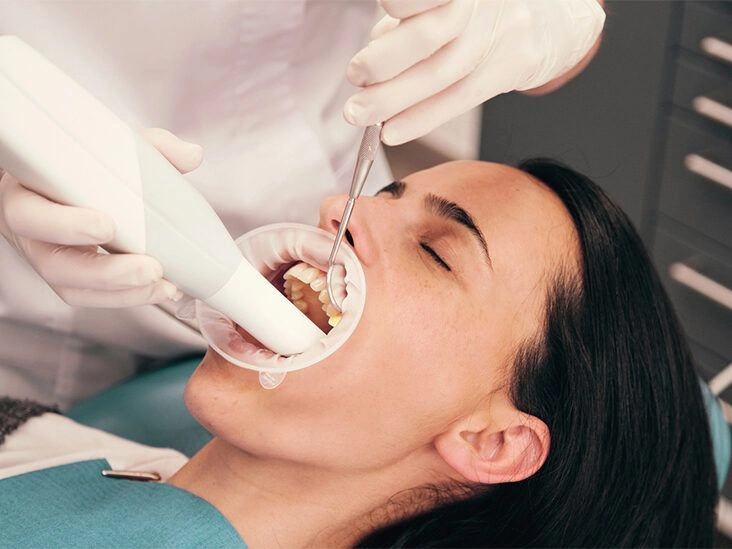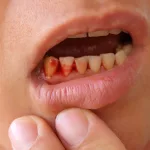Deep teeth cleaning, also known as periodontal scaling and root planing, is a frequently performed treatment for gum disease that eliminates bacteria above and below the gumline. It can help reduce the risk of losing teeth in the future.
Good oral care can combat bad breath and help prevent gum disease. That’s why brushing twice daily, flossing every day, and getting a routine dental cleaning twice a year are important.
A dentist may suggest a more intensive cleaning if you show signs of gum disease. This can help protect against tooth loss down the road.
Below is an overview of deep teeth cleaning, including possible downsides of the procedure.
What is deep teeth cleaning?
Deep teeth cleaning, sometimes called periodontal scaling or root planing, removes plaque and tartar buildup on your teeth to lessen gum inflammation and improve periodontal health.
Signs that you may require a deep cleaning include:
- gums that bleed
- receding gums
- teeth that feel loose
Plaque is a sticky film that forms on teeth and contains bacteria; it builds up when food particles combine with saliva. Proper toothbrushing can remove daily plaque without scrubbing your gums too hard.
However, brushing doesn’t reach all the spaces between teeth. Remaining plaque can harden into tartar (calculus).
Accumulated plaque and tartar can cause gum disease, including gingivitis (gum inflammation). If untreated, gingivitis can progress to periodontitis, a severe infection that damages the bone supporting the teeth.

Optum Now is operated by RVO Health. By clicking on this link, we may receive a commission. Learn more.
Routine cleaning vs. scaling and root planing
A routine dental cleaning targets plaque and tartar above the gumline.
Scaling and root planing is a deeper procedure that also removes plaque and tartar below the gumline.
Dentists perform this more extensive cleaning to manage gum disease. It clears buildup from the pocket between the tooth and gum formed by inflamed or receding gums. Typically, it’s recommended for people with pocket depths greater than 4 millimeters (mm).
What are the advantages of deep cleaning teeth?
If gum disease has caused your gums to pull away from your teeth creating pockets deeper than 4 mm, a deep cleaning may be necessary.
As gum disease advances, pockets between the gums and teeth can widen, allowing more bacteria to accumulate. Increased bacterial levels cause more inflammation and can destroy the bone surrounding teeth. That bone loss can weaken tooth support, potentially causing loose teeth or tooth loss.
If your dentist advises a deep cleaning, benefits may include:
- halting the progression of gum disease
- treating an existing infection and aiding healing
- cleaning tooth surfaces both above and below the gumline
- reducing halitosis caused by gum disease
- protecting tooth roots
What are the disadvantages of deep cleaning teeth?
While deep cleaning can be effective for treating gum disease, the procedure has some potential risks. In general, the benefits outweigh these risks.
Possible drawbacks of deep cleaning include:
- It may not guarantee that gums will reattach to teeth.
- It might not correct already receded gums.
- There is a risk of infection if your immune system is weakened.
- It can cause pain and increased sensitivity.
- Although rare, there’s a potential for nerve injury.
Pain and sensitivity are common after the procedure. Discomfort may last one to two days, and sensitivity might persist for up to a week.
Adverse effects from deep cleaning are usually mild and resolve in about 5 to 7 days, though more extensive cases may take a few weeks to recover.
If gum disease returns, additional deep cleanings may be required.
What does deep cleaning teeth involve?
Deep teeth cleanings differ from routine visits. Regular cleanings remove plaque and tartar above the gumline, whereas deep cleanings reach below the gumline to clear trapped debris.
Gum disease creates pockets between your teeth and gums where tartar and plaque can lodge. Cleaning beneath the gumline removes this buildup.
The procedure commonly requires local anesthesia or a numbing agent.
Deep cleaning involves gum scaling and root planing
Deep cleanings are often completed over two or more appointments and include both gum scaling and root planing. Each session may last around an hour.
During the scaling appointment, the dentist removes plaque and tartar from beneath the gumline. In the root planing session, the dentist smooths and cleans the roots of the teeth to remove buildup. Eliminating this accumulation decreases pocket depth and helps gums reattach to teeth.
You may need to take antibiotics
If your immune system is compromised because of a health issue or immune-suppressing medication, you might be prescribed antibiotics for a few days after the treatment, although this is uncommon. The reason is an increased risk of infection after the procedure. Deep cleanings can occasionally introduce bacteria into the bloodstream.
A dentist may also recommend a medicated mouthwash to lower infection risk.
Is deep cleaning painful?
Scaling and root planing can cause some discomfort, so a topical or local anesthetic is usually used to numb the gums.
Some sensitivity is expected following the procedure. Gums may be swollen, and minor bleeding can occur.
How to reduce sensitivity after the procedure
You can take steps to ease tooth sensitivity and discomfort by:
- Adjusting your diet: For a few days after treatment, choose soft foods such as yogurt, applesauce, or mashed potatoes to limit sensitivity. Your dental provider may advise avoiding very hot or cold foods and beverages like hot or iced coffee and tea.
- Using pain relievers: Over-the-counter analgesics, such as acetaminophen (Tylenol) or ibuprofen (Advil), can help manage pain.
- Rinsing with warm salt water: A dental professional may suggest rinsing with warm saline to reduce bacterial presence and encourage healing.
- Maintaining daily oral care: Regular brushing and flossing support healing and reduce ongoing gum inflammation. Use a soft-bristled toothbrush at least twice daily and floss before brushing at least once daily.
After the procedure
Following the procedure, maintaining good oral hygiene is essential to prevent further progression of gum disease.
This includes:
- flossing once a day before brushing
- brushing your teeth twice a day
Gum disease can return or progress. If that happens, you may need further deep cleanings or alternative treatments, including surgery.
»Read more:How long to brush your teeth forHow much does deep teeth cleaning cost?
The price of deep cleaning varies based on how advanced the gum disease or inflammation is.
You’ll probably need two visits, though some people require up to four appointments to fully remove tartar and plaque. During these sessions, your mouth is treated in quadrants. Depending on location and extent of treatment, costs can be $100 or more per quadrant.
If you have dental insurance, many plans cover part of the cost of deep cleanings, leaving a copayment; coverage depends on documented periodontal disease and medical necessity.
It’s wise to confirm your insurance coverage before scheduling the procedure.
The bottom line
For people with gum disease, deep teeth cleaning can reduce bad breath and slow the disease’s progression. It may also help prevent future tooth loss.
Some patients will require more than one session to complete the deep cleaning.
While generally safe and common, expect some sensitivity and swelling afterward. If bleeding, swelling, or pain continues beyond a week after the treatment, contact your dentist.


















Leave a Reply
You must be logged in to post a comment.